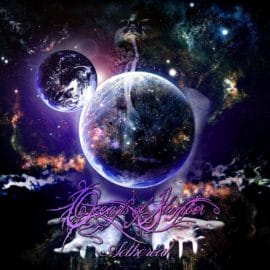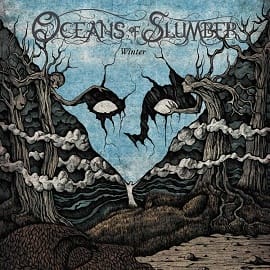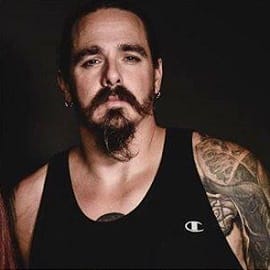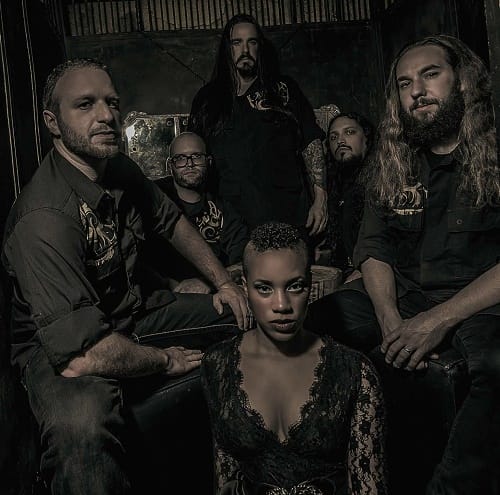In March the Texans of OCEANS OF SLUMBER generated buzz in the progressive orientated part of the metal scene with the release of their new album „Winter„. The versatile record, on which new singer Cammie Gilbert could be heard for the first time, was received very well both by music loving people and critics. The band went on tour with My Dying Bride and played as support act for Enslaved and Ne Obliviscaris. We met drummer, pianist and songwriter Dobber Beverly at their concert in Munich in October and talked about their new album, their way of playing music and the social and political situation for metal bands in the conservative state Texas.

How has your tour been so far?
It has been good. It has been hectic because of schedules and stuff. We had to be at the venues early, we get out of the venues late and then we have to drive. Since we are independent, it’s more effort because we have no crew or anything like this. It’s easy and hectic and terrible at the same time.
Your new album “Winter” has been out now since March. How has the response been so far?
The response has been amazing. I think it has been received in a way we needed it to be. We come from a more old school background and style. We like the record a lot of course, but when you release something like that on the world, you have no idea how they’re going to receive it and so far, it has been nice. Everybody feels it. We’re an emotional band, we’re a band of real people, we talk and play about real stuff, so we write from that kind of place. So yes, it has been awesome.
Since your last record the biggest change has been the joining of your new singer Cammie Gilbert. Did you have the idea to change your style with new female vocals or was the music already written and you just integrated her afterwards?
 From the beginning of the band I wanted to have a female vocalist anyway. I’m a huge The Gathering fan. But there’s a difference between a heavy metal vocalist and a southern bluesy gospel vocalist. When she came in, she cleaned up the lyrics we had written. She did her own thing vocally, but as far as her dictating the kind of direction that we went, she absolutely did not change anything, because the record was finished probably a year before she joined the band.
From the beginning of the band I wanted to have a female vocalist anyway. I’m a huge The Gathering fan. But there’s a difference between a heavy metal vocalist and a southern bluesy gospel vocalist. When she came in, she cleaned up the lyrics we had written. She did her own thing vocally, but as far as her dictating the kind of direction that we went, she absolutely did not change anything, because the record was finished probably a year before she joined the band.
The difference between “Aetherial” and “Winter” is that “Aetherial” was like a testing around to see what the four of us could write together. We were just playing around and seeing what we could come up with. “Winter” is focused on a particular set of musical expressions. We’re still more than capable of doing the death metal stuff and all the technical stuff. That’s just stuff that we can do, but we wanted to focus a lot more on songwriting and building a mood. It’s like a cinematic kind of thing, like building textures and scenes. Even on our new record, that we’re partially finished with now, we might deviate more into syncopated and technical style things, but it’s only because it’s calling for it, it’s not because we need it to. That’s the thing about this whole band. The expansion of our vocabulary allows expression, it allows conveying. We’re trying to build an emotional connection with ourselves and the music that we play and listen to.
The record itself is very versatile when it comes to musical styles. The title however is very short and simple. What was the idea behind that?
 The idea of the title of the record was that winter is the coldest time of the year. The seasons change. It’s like you’re building up to it. When spring comes back around it’s like a relief. Everything is mild and the air is nice. It’s not like this oppressive blanket of bleakness that winter is. So when winter gets here, it’s snowing, you hate it and it’s fucking terrible. But “Winter” was meant to signify the season in a person’s life. It’s supposed to be the darkest moment or the darkest time in your life. While being alive and having relationships with people and everything else you do as a person, you find that you go through a lot of dark times and those things define you more. Whenever you’re meandering along and things are going fine, your time passes and you never change or evolve. Your outlook isn’t being effected so much that you change the way you see and feel about everything around you in your life. „Winter” is meant to be that, it’s not about snow and cold. (laughs)
The idea of the title of the record was that winter is the coldest time of the year. The seasons change. It’s like you’re building up to it. When spring comes back around it’s like a relief. Everything is mild and the air is nice. It’s not like this oppressive blanket of bleakness that winter is. So when winter gets here, it’s snowing, you hate it and it’s fucking terrible. But “Winter” was meant to signify the season in a person’s life. It’s supposed to be the darkest moment or the darkest time in your life. While being alive and having relationships with people and everything else you do as a person, you find that you go through a lot of dark times and those things define you more. Whenever you’re meandering along and things are going fine, your time passes and you never change or evolve. Your outlook isn’t being effected so much that you change the way you see and feel about everything around you in your life. „Winter” is meant to be that, it’s not about snow and cold. (laughs)
Concerning your drumming: You have these rather complex, smooth, almost jazzy or bluesy parts and then you have these simple, but really fast blast beats and double bass parts of death and black metal drumming. Which of these styles need more practice?
 The complexity is where the work’s at. Drummers aspire and fight to get a certain touch and it’s not like I’m finished with finding it. But luckily, I found my place and kind of Steve-Gadd-esque groove drumming with what they call “gospel chops” these days even though I’m the furthest from gospel you can get. About ten years ago, I heavily got into latin, jazz, Dave Weckl and Jojo Mayer style drumming, even kind of experimental drum ‘n’ bass stuff. I’m not entirely a huge electronic music fan, but I do love the drumming and the live drummers. When it comes to learning, it is absolutely the hardest stuff. The easiest to learn is the fast stuff, but it’s the hardest to maintain, because of the level of separation with the notes and everything that comes with that. I don’t spend as much time as I used to doing that stuff. I let my technical side take over that the best I can. But I also come from about 20 years of playing death metal and grindcore.
The complexity is where the work’s at. Drummers aspire and fight to get a certain touch and it’s not like I’m finished with finding it. But luckily, I found my place and kind of Steve-Gadd-esque groove drumming with what they call “gospel chops” these days even though I’m the furthest from gospel you can get. About ten years ago, I heavily got into latin, jazz, Dave Weckl and Jojo Mayer style drumming, even kind of experimental drum ‘n’ bass stuff. I’m not entirely a huge electronic music fan, but I do love the drumming and the live drummers. When it comes to learning, it is absolutely the hardest stuff. The easiest to learn is the fast stuff, but it’s the hardest to maintain, because of the level of separation with the notes and everything that comes with that. I don’t spend as much time as I used to doing that stuff. I let my technical side take over that the best I can. But I also come from about 20 years of playing death metal and grindcore.
I play in another band called Insect Warfare – insanely fast grindcore, we headlined Obscene Extreme festival in Czech Republic in July – and to go back and have to do that kind of music reminded me of how much work it took in maintenance for the type of playing I do. I’m not a stationary, modern death metal drummer. I don’t play with my fingers a whole lot. I got hand surgery on both hands, so everything comes out of a different place. It’s all more physical. It’s like Mikael Åkerfeldt was saying years ago. Somebody said that his death metal singing must tear his voice up and he [Åkerfeldt] said that it’s actually far more difficult for him to sing clean and it’s worse for him. The death metal is the easy thing. If I were to just sit down and only have to play extreme metal, then it’s an easier task than having to have a dynamic range from zero to ten. If you’re only expected to play for example at nine out of ten, all you’ve got to do is play fast skank beats and shit. That’s one side. But if I have to combine all of it, it’s very draining. It takes a lot out of me.
Do you play with a click track on your ear?
No, absolutely not, though I understand it. I have a really good comfort with timing, but we also go on stage and we speed a song up a little bit, or slow a song down on a particular night, depending on how we feel. I want that. I want the intensity and the reality of playing and I don’t want to balance my bandmates and then balance me against the click track, because I don’t want anything holding us down or compressing us.
You covered “Nights in White Satin” by Moody Blues on “Winter”. Why did you choose to record this track for the album.
Firstly that song is beautiful, it’s an insanely amazing song. All of us have pretty much been listening to that song for 30 years. Secondly it fit the theme of the record. Forlorn love loss, want, need. The record carries that so well for us. The core members – Keegan, Anthony, Sean and myself – are all huge Type O Negative fans. Type O Negative did an awesome cover song on every record and kind of keeping in tradition with that I wanted to do the same thing. I like that a lot. We all love music so much. Interpreting songs is something we like doing a lot. If there’s ever been a song you heard that you wish you would have written, you would love to play it. Or you hear a song and think “well I hear it this way!” and you want to make some changes. That’s how we do it.
 You are from Texas, which has the reputation of being socially and politically very conservative. Has it ever caused any problems or difficulties for you?
You are from Texas, which has the reputation of being socially and politically very conservative. Has it ever caused any problems or difficulties for you?
Politically and socially we haven’t been affected in any kind of ways. The religious elitism is not really existent anymore, it has gone into the wayside. The racial tension is more medial. I mean, our singer is black. Only the lowest common denominator dump is a place of refuge for that thought. Houston is a heavily African American city. A third of our population is white, a third is black and the other third is Hispanic and Asian. It’s actually the most diverse metropolitan city in the world, I believe, which is crazy. Between all people of the world who live there – which we have a lot, our population is roughly seven million – the conservative side of it is the worst part.
I can agree with some conservative values, like family structure and things like that, but I’m certainly not anti-gay or anti-abortion, because that’s a personal decision for anybody. That’s nobody else’s business. But I think it’s good if the family is functional and operational. I like a mom and a dad with a kid, or a dad and a dad, or a mom and a mom. If you’re preaching family values, that’s amazing, but if you’re preaching hate and that kind of nonsense, then fuck off! But we don’t really have to deal with it. It’s more in the rural areas, I’m sure it’s the same here in Germany. You go to the rural areas to where people are older and closed off and they probably hate refugees, they hate non-Americans. We have that, but it’s far more talk than it ever is action.
Finally, I’d like to do our traditional Metal1.info brainstorming with you. I give you some keywords and you say the first thing that comes to your mind.
Winter: Depression.
Favourite movie: “The Fountain” and “The 13th Warrior”, depends on my mood.
Donald Trump: Fucking idiot! (laughs)
ZZ Top: Ehm… Beer. (laughs)
Favourite album of 2016: Evergrey – The Storm Within
Thank you for your time. Your final words to our readers?
Thank you for the interview. Thanks for checking our record out. Hopefully we make it into somebody’s home and people are able to recognize and connect with what we do. We’re a real live band, a real emotional, breathing machine on stage.
Publiziert am 22. Dezember 2016 von Simon Bodesheim